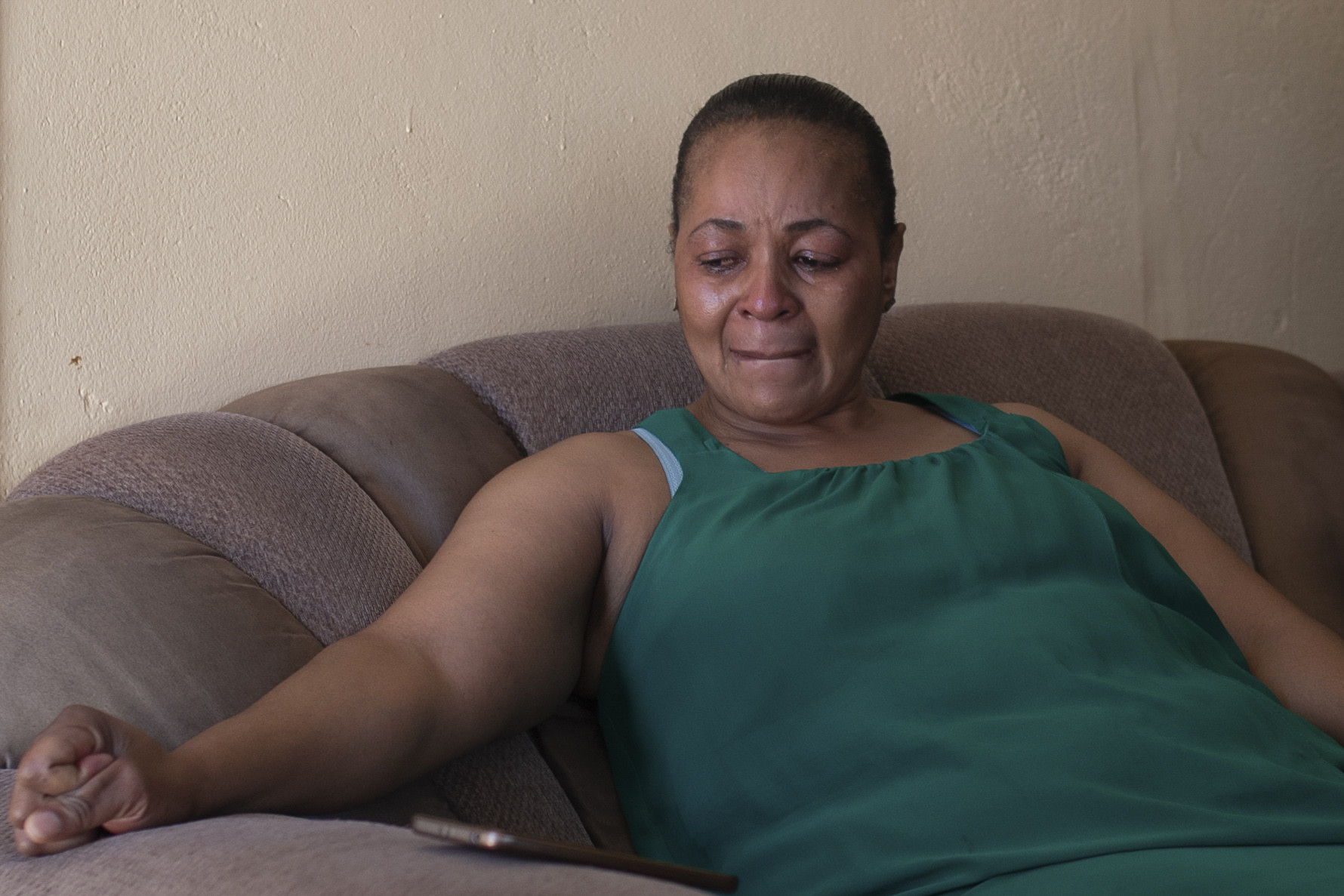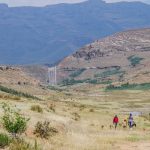Protesters killed in vain as taps still run dry
The families of two people killed during protests over lack of water and state corruption say they will not vote in the upcoming elections.
Author:
26 February 2019

The televised police shooting of community activist Andries Tatane on 13 April 2011 shut down the small cherry-farming community of Ficksburg in the Free State.
Tatane was 33 years old when police opened fire on unarmed residents during a protest in Meqheleng township. Strewn with debris and potholes, the township lies on the outskirts of the small town, which borders Lesotho.
Kitlano Leeuw, 16, was also shot and killed during a protest in Taung, North West, in April last year. But residents say the killings of Tatane and Leeuw were in vain.
Distrusting the system
Tatane’s sister, Seipati, 52, recounts the hours leading up to her brother’s death.
Her voice quivers when she talks about her distrust of the justice system. In 2013 the Ficksburg Regional Court acquitted the seven police officers accused of killing her brother.
The government “continues to fail its people”, she says.
“It is still painful … the way he was killed. He was killed like a dog in front of the whole world and no one was held accountable,” says Seipati, crying.

Drought and disillusionment
She was at work when the police shot her younger brother at a protest over corruption and lack of access to water and other services for the community of more than 40 000 residents.
Along with Clocolan, Marquard and Senekal, Ficksburg was one of the four towns hardest hit during the latest drought. Setsoto Local Municipality administers these towns.
The authority was placed under administration after the summary of a report, ordered by Free State member of the executive council Mamiki Qabathea after Tatane’s death, revealed the municipality’s financial woes.
Related article:
Shot in the chest, Tatane was declared dead at a local hospital. “When I went into the ward, he was gone,” says Seipati.
The grey, three-bedroom house built by the Free State government adjacent to the old Tatane family home is a daily reminder of her slain brother. It was one of the many promises the ruling party made to cushion the blow of Tatane’s public death.
“Even now I hate this house, ke leromo pelong ya ka (it is a sword in my heart),” she says.
But some other promises were never fulfilled, she says. According to Seipati the ruling party had promised jobs to family members.
Persistent lack of water
The mother of two is unimpressed by President Cyril Ramaphosa’s tenure and has vowed to vote for “anything but the ANC” in the upcoming general elections on 8 May.
Seipati says the water crisis that cost Tatane his life remains unresolved. According to her, residents are still battling to access clean water and unemployment continues to grip the small community.
“We have not seen change. Instead of seeing progress, the community continues to regress,” she says. “In December, we didn’t have water for more than two weeks.”
Related article:
In addition, there are rubbish heaps in most parts of Meqheleng.
Seipati says the daily hardships residents face do not inspire people to go to the polls. Like many South Africans, she is troubled by the lack of alternatives ahead of elections and will not vote for the ANC “should I vote”.
“They killed him and kept quiet,” she adds.
Although Seipati’s neighbour, Tshokolo Mohatlane, 58, shares her views, he has promised to vote wisely at the polls.
“I have not seen any changes in the past eight years. The whole country is struggling with the same challenges.”
A mineworker in Rustenburg, Mohatlane hopes a coalition government will force politicians to focus on serving constituents.

‘He was my hope’
About 400km away, in Taung in North West, Anna Leeuw, 51, seeks justice for her son’s death.
“I miss the sound of his footsteps when he walked into the house after school. He was my hope,” she says.
Kitlano was shot in the head, allegedly by the police, just two minutes from his home in Extension 6. Leeuw says no one has been arrested for killing her son.
North West police spokesperson Sabata Mokgwabone referred New Frame to the Independent Police Investigative Directorate (Ipid). The unit has been tasked with investigating Kitlano’s death.
“Ipid is investigating a death as a result of police action in line with section 28 of the Ipid Act. The investigation is ongoing,” said directorate spokesperson Moses Dlamini.
The investigation needs two outstanding statements before it can be completed, he said.
“When the statements have been obtained, we will compile our report to the director of public prosecutions.”
Xenophobic reaction
Kitlano’s death drove the mining community into a violent rage that led to the torching and looting of shops owned by migrants.
The teenager had gone to buy a cool drink at a nearby tuckshop when his curiosity drew him to a group of protesters calling for better services at healthcare facilities, as well as the resignation of embattled then North West premier Supra Mahumapelo.
“Kitlano’s friend stormed into the house and told me that my son had been shot. I ran to the scene and my son was lying in a pool of blood,” she wept.
He was declared dead at the scene.

No arrests
A year later, no one has been detained for the death of the grade 10 learner who had hopes of becoming a geologist and played as a striker at a local soccer club. Leeuw says Kitlano was a happy teenager eager for greatness.
Her contempt for the justice system is evident in how her son’s case has been handled.
“My child died in vain. No one was arrested for his death, no one took responsibility. I want to know who killed my son,” she says.
The Leeuw family has now sought private legal counsel.
Like Seipati, Leeuw will not vote on 8 May.
ANC boycott
The sleepy mining town with a population of around 177 600 people is in the south of North West province. An ANC stronghold, the remote community, with one main street, is home to predominantly Tswana residents.
Extension 6 resident Christopher Madito, 51, blames the Greater Taung Local Municipality for poor service at state institutions in the province.
“Unemployment and corruption is high. We have so many graduates loitering in the streets,” Madito says. Despite efforts made to get community members to the polls, Madito is convinced local drinking hubs will be filled to capacity come election day.
“Residents are going to boycott the elections by filling the taverns and drinking. The ANC thinks they will live until Jesus comes, we will show them at the polls”.
He says locals have not forgotten how Kitlano was shot dead last year.
Self-made access to water
Monokwane Village, a remote community on the margins of Taung, is evidence of the challenges Extension 6 locals face.
A battered rural village with ubiquitous towering moku and mongana trees, Monokwane villagers are forced to draw water from a self-made water canal parting the village.
Residents say the water flows from the town of Jan Kempdorp in the Northern Cape to Pudimoe in North West. Jan Kempdorp is an agricultural town situated in the centre of the Vaalharts water canal scheme from the Vaal River.
Keamogetse Lekololwane, 30, was one of the locals collecting water at the canal when New Frame visited the village.
Ironically, there is a water infrastructure project under way but it has come to a halt, to the dismay of community members. The project was meant to bring relief to residents who have struggled with access to water for more than 10 years.

Ownership issues
Greater Taung Local Municipality spokesperson Ricky Oliphant said all water projects are administered by the Dr Ruth Segomotsi Mompati District Municipality.
According to district spokesperson Joseph Motlhasedi, the 2011 Taung bulk water supply project that was meant to address the water crisis has been marred by battles over ownership of land and of the Taung Dam.
“We are further confronted by unfortunate natural phenomena of low underground water supply due to inadequate rainfall experienced in our district,” he said.
The district says the raw water received from this scheme has been insufficient for all the users because of the size of the canal, which is small and runs mostly at full capacity.
‘False hope’
Keikanyamang Motse, 47, a mother of two, boils water from the canal to avoid the R100 transport fee to fetch water from neighbouring Letangweng, a village 40 minutes away.
Although the village has several taps, they remain dry, says Motse.
The upper part of the village does not get water at all, forcing locals to travel to Letangweng for drinking water.
Motse is tired of grievances being overlooked, empty promises and a government bled by corruption.
“What is the point of voting if all it does is give you false hope?” she says.
Protest mortality rate
According to the frequency and turmoil report published by the University of Johannesburg in 2018, more than 14 200 community protests took place between 2005 and 2017.
There is no comprehensive national list of people killed by the police while participating in protests. But media reports indicate that at least 50 people have been killed by the police during protests since the end of formal apartheid in 1994. This excludes the 34 mineworkers killed at a wage strike in Marikana in August 2012.


